Since so many people fought in the Civil War, it is inevitable that some of them would later go on to become famous, or possibly infamous, in some way either for their actions during the war or after.
The following are some famous and/or notable people who served as Civil War soldiers:
Mark Twain:
Long before he became a famous author, Mark Twain served a brief stint as a Confederate soldier in the Civil War. Twain was working as a riverboat pilot in Mississippi when the war broke out.
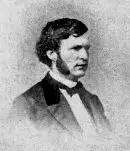
Mark Twain in 1863
Soon after, he decided to join the Confederate militia but his stint in the military only lasted two weeks before he quit and went out west.
He later faced criticism for his role in the war and for deserting but he defended himself by explaining his confusion while enrolling and stated he didn’t fully understand the politics behind the war at the time.
Alfred Packer:
Alfred Packer was a former Civil War soldier who later became a prospector and wilderness guide and was accused of cannibalism in 1874. Packer was working as a shoe maker when the Civil War broke out.
He decided to join the army in 1862 and was so proud of his new job that he had his encampment, battalion numbers and infantry numbers tattooed on his arm. His stint in the army was short lived though due to his struggle with epilepsy.
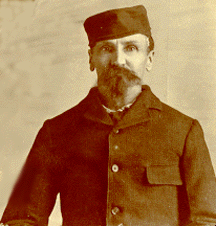
Alfred Packer in prison, circa 1874
He was discharged later that year and when he enlisted again six months later, he was discharged again for the same reason.
After his second discharge, he drifted from job to job before becoming a prospector and wilderness guide in Colorado in 1873.
Packer was accused of cannibalism and murder after one of his groups disappeared during a trip through the Colorado wilderness and their bodies were later discovered on the trail with signs that they had been eaten.
He escaped from jail and remained on the run for nine years until he was caught, tried and convicted of murder in 1883. He was eventually pardoned and paroled in 1901.
Albert Woolson:
Albert Woolson was a former drummer boy and the last living Civil War veteran when he died in 1956 at the age of 109. Woolson joined the army as a drummer boy in 1864 at age 17. His regiment never saw combat and he was honorably discharged in September of 1865.
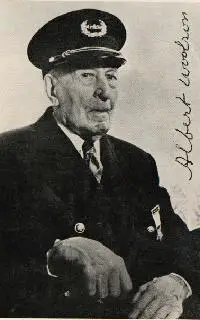
Albert Woolson
Woolson later became a member of the Grand Army of the Republic, which was an organization of Civil War veterans, and served as the group’s senior vice commander in chief in 1953. Since Woolson was the last Civil War veteran, the organization was dissolved after he died.
Chang and Eng Bunker:
Chang and Eng Bunker were conjoined twins who had made a small fortune working as sideshow performers. The twins were living in North Carolina, where they ran a plantation, when the war broke out.
In 1865, the twins were shocked to find out that Eng had been drafted by the Union army, who had recently raided the area and taken it over. The Union army had placed all the names of the local male residents into a lottery wheel and chosen them at random, which is how they selected Eng’s name.
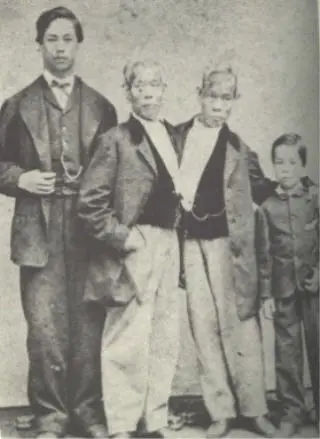
Chang and Eng Bunker (c.1865-1870)
Since Eng was selected but not Chang, and the twins could not be physically separated, there wasn’t much the Union army could do about it so they decided against recruiting Eng.
Even though the twins never officially served in the army, both of their eldest sons joined and fought for the Confederates.
Paul Revere’s Grandsons:
Three of Paul Revere’s grandsons, Paul Joseph Revere, Joseph Warren Revere and Edward Hutchinson Revere, served as soldiers for the Union army in the Civil War. Paul Joseph Revere and Edward Hutchinson Revere served in a Massachusetts regiment while Joseph Warren Revere served in a New Jersey regiment.
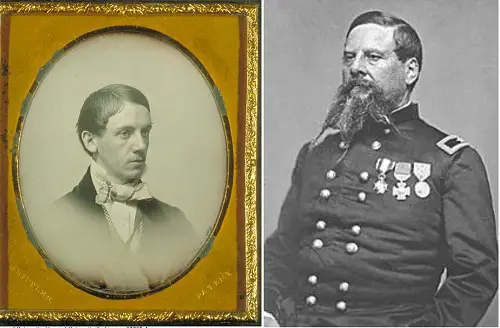
Paul Joseph Revere (left) and Joseph Warren Revere (right)
Both Paul and Edward were captured at the Battle of Ball’s Bluff and held as POWs in Richmond before being exchanged for Confederate prisoners.
Paul and Edward went on to fight at the Battle of Antietam where Paul was wounded and Edward was killed. Paul then went on to fight in the Battle of Gettysburg where he was killed.
Joseph was the only Revere grandson to survive the war but he was court martialed and allowed to resign instead of being dismissed.
Sources:
Mark Twain’s Civil War; Mark Twain, David Rachels; 2007
Albert Woolson: The Last Living Civil War Veteran: www.veteranstoday.com/2009/02/16/albert-woolson-the-last-living-civil-war-veteran/
City of Littleton: Biographies: Alfred Packer: www.littletongov.org/history/biographies/packer.asp
CNN: Seven Civil War Stories Your Teacher Never Told You: www.cnn.com/2009/LIVING/06/12/mf.civil.war/index.html#cnnSTCText
The Lake Gazette; Mark Twain Failed to Meet Ulysses S. Grant at Florida in July 1861; Nancy Stone: www.lakegazette.net/archives_articles.asp?xissuedate=110629

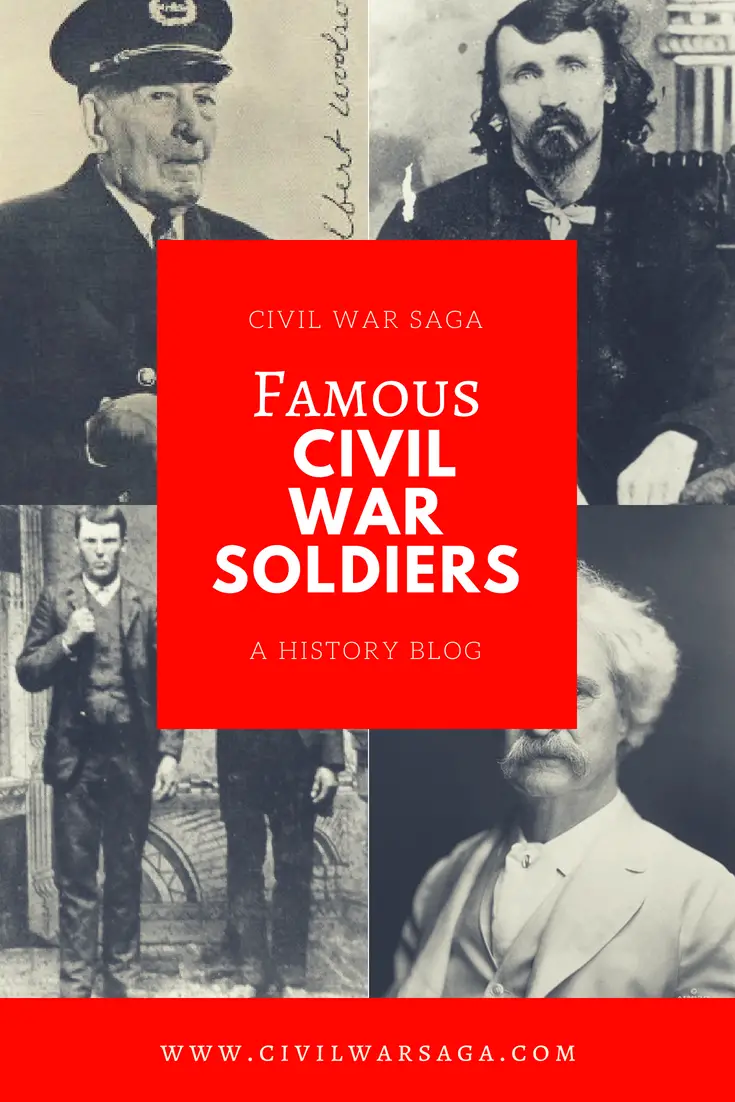
Other famous Civil War veterans:
Charles Francis Adams (1835-1915), historian and railroad executive, great grandson and grandson of US presidents John Adams and John Quincy Adams
Nelson Aldrich (1841-1915), US senator and founder of Federal Reserve
Ambrose Bierce (1842-1914?), writer
Adolphus Busch (1842-1914), founder of beer empire
George Washington Cable (1844-1925), writer
Andrew Carnegie (1835-1919), steel magnate and philanthropist
Grenville Dodge (1831-1916), railroad builder
William Eckert (1825-1910), telegrapher and president of Western Union
John Watson Foster (1836-1917), ambassador and secretary of state
Elbert Gary (1846-1927), industrialist and founder of US Steel
John Hay (1838-1905), ambassador and secretary of state
Rutherford Hayes (1822-1892), US president
Oliver Wendell Holmes (1841-1935), Supreme Court justice
Robert Ingersoll, (1833-1899), lawyer and agnostic
Eli Lilley (1838-1898), founder of pharmaceutical firm that bears his name
Thomas Reed (1839-1902), speaker of the house
Robert Todd Lincoln (1843-1926), lawyer, cabinet secretary, ambassador and son of President Abraham Lincoln
William McKinley (1843-1901), US president
Joseph Pulitzer (1847-1911), journalist
William Jackson Palmer (1836-1909), railroad builder
George Haven Putnam (1844-1930), publisher
Washington Roebling (1837-1926), builder of the Brooklyn Bridge
Carl Schurz (1829-1906), US senator, cabinet secretary and reformer
Henry Morton Stanley (1841-1904), explorer
Francis Amasa Walker (1840-1897), economist and MIT president
Lester Frank Ward (1841-1913). sociologist
George Westinghouse (1846-1914). inventor
Charles Young (1834-1908), astronomer
Benjamin Harrison (1833-1901), US President
You left out Simon Bolivar Blucker, whose son would be a General (Jr.) in World War 2 and died with newspaper columnist Ernie Pyle on Okinawa from a Japanese bombardment. Bull Halsey’s Grandfather was in a New Jersey unit, George Paton’s grandfather lead the 54th Virginia at the Battle of New Market, and Chester Pullers grandmother froze to death when the Yankees burned down her house because her son was in Southern cavalry and he had left a spur on the wall in a room. So on a cold December night they burned down her house. General McAuther of the Pacific War in WWII had a grandfather who fought Pullers unit in the war, and in the war get to Congressional Medals of Honor. One was taken back, because they were given when a flag was captured, and many times the men just went out and picked it up. They had killed all the flag barriers.
It should be noted that the creator of Coca Cola, John Pemberton served in the Confederate Army and was almost fatally wounded in 1864.
Not to be confused with John C.(Clifford) Pemberton, who was in command during the Vicksburg Campaign and ultimately surrendered the city to Ge. Grant. John S. Pemberton was wounded at the Battle of Columbus in 1865, and his ensuing morphine addiction led him to experiment with various painkillers and toxins, which in the end, this led to the recipe that later was adapted to make Coca-Cola.
Robert Ingersoll (1833-1899) Agnostic
James Walter Thompson (1847-1928) Advertising pioneer
Albert Pope (1843-1909) Early bicycle and automobile manufacturer
John Wesley Powell (1834-1902) Geologist and explorer of Grand Canyon
John Patterson (1844-1922) leader of National Cash Register
Additional famous Civil War soldiers:
Elisha Benjamin Andrew’s (1844-1917): Educator and president of Brown
Samuel Comstock (1844-1914): Censor and activist against indecency
Albert Pope (1843-1909): Early bicycle and automobile manufacturer
James Walter Thompson (1847-1928) Advertising pioneer
John Patterson (1844-1922) Head of National Cash Register and pioneer in development of innovative sales technologies. Major influence on Ton Watson, founder of IBM.
John Wesley Powell: Explorer and discoverer of Grand Canyon
The most obscure President Chester A. Arthur served in the New York State Militia as Engineer-in-Chief, Inspector General, and Quartermaster General from 1861-1863
The President before Arthur James A. Garfield, served as a Major General for the Union Army, from 1861-1863, in the 42nd Ohio Volunteer Infantry, participating in many battles including Shiloh and Chickamauga
A few that served in the Vicksburg Campaign :
Pvt. Charles E. Bowles
Lt. Peter Hains
Corp. Joseph Lee Haywood
Captain James Ritty
Captain George W. Schofield
Col. Henry Dana Washburn
Other famous civil war veterans.
Jessie Woodson James (1847 – 1882) Bushwacker – Partisan Ranger
Frank James (1843-1915) Bushwacker – Partisan – Ranger
James Butler Hickok/Wild Bill – (1837-1876) Red legs & Jay hawker
William Frederick “Buffalo Bill” Cody (1846-1914) Red legs
John H. Brown Jr. (1821 –1895) Abolitionist – Red Legs
George Caleb Bingham (1811 – 1879) Artist/Politician Union
Black Beaver (1806-1880) Delaware – Union Scout
Professor T. S. C. Lowe (1832 – 1913) Aeronaut – Union, Inventor
Charles E. Bassett (1847 – 1896) Dodge City, KS first sheriff and marshal/Long Branch Saloon owner. Deputies were Bat Masterson & Wyatt Earp. Union Army PA
Cole Younger – (1844–1916) Bushwacker – Partisan Ranger, James-Younger Gang
Jim Younger (1848–1902) Bushwacker, Partisan Ranger, James-Younger Gang
Ben Thompson (1843 – 1884) Confederate TX, Lawman/Gunfighter
Texas Billy Thompson (1845 – 1897) Brother of Ben Thompson, Confederate, Gunfighter
Virgil Earp (1843 – 1905) Deputy and Marshal Tombstone AZ, Union Army
James Earp (1841 – 1926) Union
Newton Earp (1837 – 1928) Union
Charles E. Boles AKA; Black Bart (1829 – 1888) Outlaw Union
Sir Henry Morton Stanley (1841-1904) explorer, journalist, author and politician.
CS 6th Arkansas inf
Union Army and later US Navy serving on board USS Minnesota.